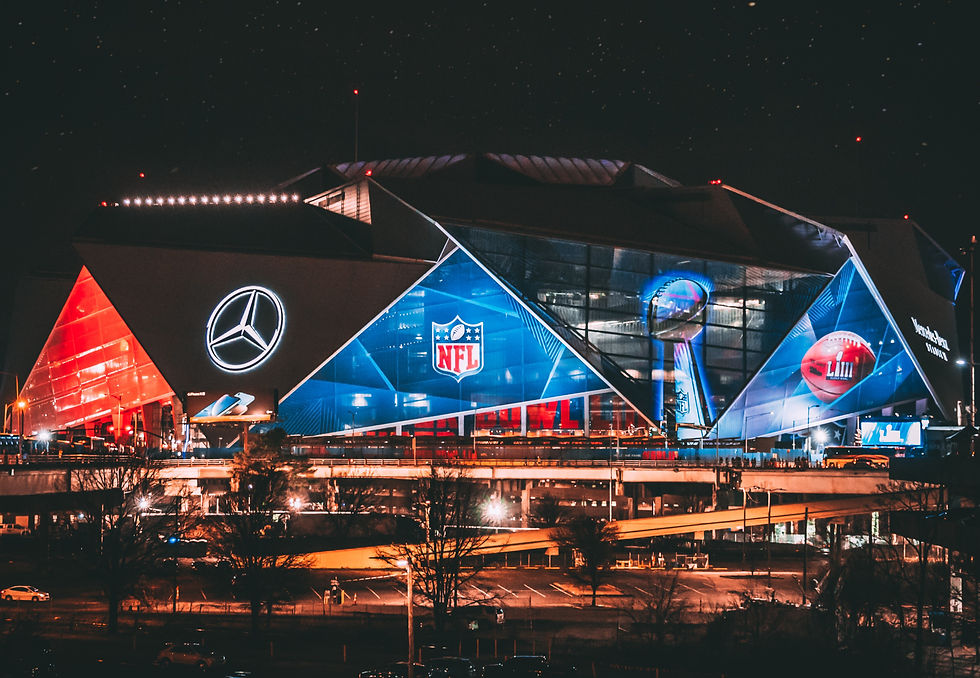Scoring Big: The Economic Ripple Effects of Major Sporting Events
- Taylor's Economics Club

- Mar 23, 2025
- 3 min read
Updated: Apr 6, 2025

One of the most immediate economic benefits of major sporting events is the surge in tourism. Millions of fans travel worldwide, booking flights, hotels, and restaurants, leading to increased business activity. The 2018 FIFA World Cup in Russia, for example, attracted over 3 million visitors, contributing approximately $14 billion to the economy (FIFA, 2019). Similarly, Japan’s Tokyo 2020 Olympics, despite pandemic restrictions, generated substantial revenues from broadcasting rights and sponsorship deals (International Olympic Committee [IOC], 2021). However, while tourism surges during the event, some host cities experience a sharp decline afterward, making long-term economic planning essential (Preuss, 2018).
Hosting a major sporting event often requires massive infrastructure investments, including stadium construction, transportation upgrades, and urban redevelopment. While these improvements can provide long-term benefits, they also come with significant financial risks. Brazil’s 2014 World Cup saw investments of nearly $15 billion, but some of the newly built stadiums became underutilized "white elephants" after the event (Zimbalist, 2015). In contrast, the London 2012 Olympics successfully repurposed its facilities, such as the Queen Elizabeth Olympic Park, which continues to attract visitors and businesses (Gold & Gold, 2016). The key challenge is ensuring that these projects remain valuable assets rather than financial liabilities
Large-scale sporting events generate thousands of jobs, from construction workers to event staff. However, many of these positions are short-term, disappearing once the event concludes (Baade & Matheson, 2016). The London 2012 Olympics, for example, was praised for creating employment opportunities and urban renewal that continued to benefit the economy years after the event (Gold & Gold, 2016). In contrast, South Africa’s 2010 FIFA World Cup experienced a post-event employment decline, as temporary jobs were not converted into permanent positions (Pillay et al., 2013). Strategic planning is necessary to ensure that job creation provides lasting benefits rather than a temporary economic boost.
Corporations invest heavily in sponsorship deals and broadcasting rights, generating billions in revenue. The 2022 FIFA World Cup in Qatar secured $7.5 billion from sponsorships and broadcasting rights, the highest in FIFA history (FIFA, 2022). While these deals provide financial stability for event organizers, host nations often struggle to recover costs purely from ticket sales and tourism revenue (Preuss, 2018). Corporate partnerships play a crucial role in ensuring the event remains financially viable, but they do not always guarantee economic success for the host country.
Despite the potential economic benefits, major sporting events come with financial risks. Some host countries experience budget overruns, underused infrastructure, and slow returns on investment. The 2004 Athens Olympics contributed to Greece’s financial crisis due to excessive spending on venues that later fell into disuse (Zimbalist, 2015). Similarly, the Montreal 1976 Olympics left the city with $1.5 billion in debt, which took 30 years to repay (Baade & Matheson, 2016). Without careful financial planning, the costs of hosting can far exceed the economic gains, leaving cities and nations burdened with debt.
The economic impact of major sporting events depends on careful planning, execution, and long-term vision. Nations that strategically leverage infrastructure, tourism, and sponsorship opportunities can experience lasting benefits. However, for some, the financial burden outweighs the rewards. As cities continue to compete for the honor of hosting these global spectacles, the real game is not just on the field, but in the economy.
Written by:
Kareena Kaur Boparai,
3rd Year Student at Taylor's University,
Bachelor of Business (Honours) in Finance and Economics.
References:
Baade, R. A., & Matheson, V. A. (2016). Going for the gold: The economics of the Olympics. Journal of Economic Perspectives, 30(2), 201–218.
FIFA. (2019). FIFA World Cup Russia 2018: Post-event report. Fédération Internationale de Football Association.
FIFA. (2022). FIFA World Cup Qatar 2022: Financial report. Fédération Internationale de Football Association.
Gold, J. R., & Gold, M. M. (2016). Olympic cities: City agendas, planning, and the world’s games, 1896–2020. Routledge.
International Olympic Committee (IOC). (2021). Tokyo 2020 economic impact report.
Pillay, U., Tomlinson, R., & Bass, O. (2013). Development and dreams: The urban legacy of the 2010 FIFA World Cup. HSRC Press.
Preuss, H. (2018). Event legacy: How mega sports events can contribute to sustainable development. Springer.
Zimbalist, A. (2015). Circus maximus: The economic gamble behind hosting the Olympics and the World Cup. Brookings Institution Press.
Disclaimer:
An AI writing assistant was utilized in ideation of the content. However, all material has been written and reviewed by the author herself.



Comments